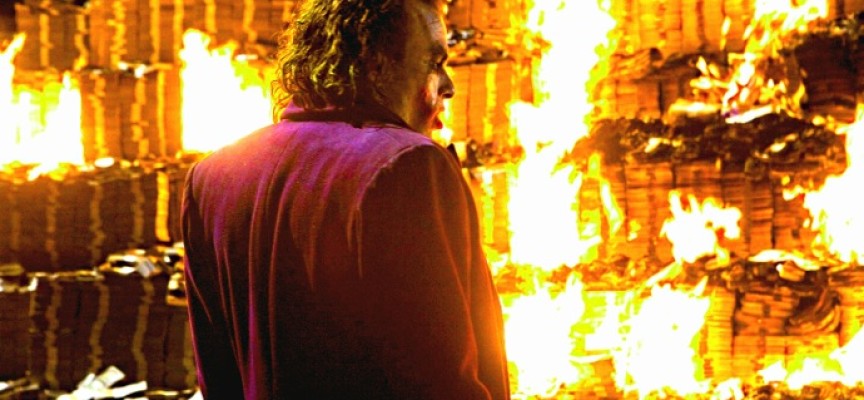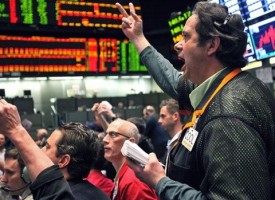We are now on the edge of a global currency apocalypse.
Rising interest rates are set to collapse the establishment
October 20 (King World News) – Alasdair Macleod: While interest rates were in long-term decline, the consequences of increasing state dominance appeared benign. Put crudely, so long as falling interest rates were driving financial asset values ever higher, the global investment community happily turned a blind eye to the inevitable consequences of Keynesian macroeconomics. Investors were content to buy government debt in the knowledge that values were underwritten by monetary policy.
Now that the inflationary consequences have finally arrived in the form of consumer and producer prices rising out of control, the spell of zero and negative interest rates has been shattered, and investors face growing losses and a widespread loss of confidence in the future.
Banks enter a phase of rising interest rates and falling asset values with overleveraged balance sheets. Bank directors are duty-bound to protect their shareholders from these changed circumstances. They have started to do so by reducing their exposure to financial assets, notably including bonds and collateralised loan obligations. They have also reduced their exposure to margin accounts used by speculators to leverage gains.
We are beginning to see activity in the $600 trillion mountain of OTC derivatives being curtailed. Troubled banks, such as Credit Suisse, are axing trading desks, and as part of its restructuring said to be looking to sell its structured products unit. Though it is in its early stages, the withdrawal of OTC paper supply will have profound effects on markets and commodities. Market participants will have to adapt to other strategies for hedging risk. And the removal of paper supply of energy and commodities will divert demand into physical stocks, driving prices yet higher. Failure to meet margin calls will become a serious problem…
ALERT:
This company is about to start drilling what could be one of the largest gold discoveries in history! CLICK HERE OR ON THE IMAGE BELOW TO LEARN MORE.
So far, non-financial businesses, Main Street as opposed to Wall Street, have generally found that their bankers are reluctant to extend loan and overdraft facilities. But the banks are so highly leveraged, particularly in Europe, Japan, and Britain, that the contraction of bank credit is bound to undermine their GDPs. Other commercial banking networks less leveraged are bound to follow.
The contraction of GDP is because commercial bank credit in the form of customer deposits settles nearly all transaction payments recorded in GDP, with the exception of a relatively minor proportion of payments settled in banknotes — which for our purposes can be ignored. When bank credit deployed in GDP contracts, GDP itself contracts as well. It is the contraction of bank credit which drives the fall in GDP, not a reluctance of economic actors to act. Irrespective of economic and monetary policies, contraction of bank credit is evidenced in a slump. It becomes a self-fulfilling event, with bankers increasingly acting as a cohort.
The initial rise in interest rates currently experienced exposes malinvestments, and bankers’ commercial information informs them of deteriorating lending conditions. Therefore, they are further discouraged to extend loan finance and will seek to liquidate loans to businesses generally. What starts off as a prudent policy of risk containment rapidly degenerates into a bankers’ panic, driven by fear of losing all shareholders’ capital. And the higher the balance sheet leverage, the greater is the fear.
Faced with rapidly contracting bank credit, the establishment blobs around the world are sure to coordinate their actions in an attempt to save market values and offset contracting GDP. With a high degree of confidence, we can forecast that they will reintroduce quantitative easing, offer banks loan guarantees, rescue failing banks and double down on supressing interest rates. They are already managing prices and subsidising production in energy, actions likely to be extended to other consumer products. They might even try to suppress ownership of gold. In short, they will do whatever it takes for the financial and non-financial status quo to survive.
Government establishments need to take these actions for their own survival. The common factor in these policies will be an accelerating debasement of government-issued fiat currencies. It is a trend already apparent. Sterling, the euro, the yen, and China’s yuan are all sliding against the world’s reserve currency, the dollar.
But the dollar’s strength is an illusion because its debasement is happening too. The Fed’s intention to quantitative tighten will shortly be abandoned: after all, these are hardly the conditions for it to contract credit. Instead, along with the other major central banks, the Fed will seek to replace contracting commercial bank credit with expanding central bank credit and provide support for collapsing bond markets. And when observers see the Fed coordinating its policies with the other central banks, its safe haven status as the world’s reserve currency will be exposed for what it truly is — just another fiat currency facing infinite inflation.
After the currency apocalypse
Following the collapse of fiat currencies, will libertarianism arise from its grave? The politics suggest that is unlikely, but there are positive outcomes. Even if a currency loses almost its entire utility as a medium of exchange, it will still be useful as a mechanism for distributing its replacement. Tying it however tenuously to legal money, which today is only physical gold, can be expected to stabilise the situation. Subsequent economic and monetary policies will then determine whether a replacement currency will last.
The global groupthink that currently coordinates and drives economic and monetary policies will not survive a currency collapse. Nor, it can be said, will the Keynesian economic beliefs which got us into this mess. The evidence from eighteenth century France, which experienced the collapse of John Law’s livre in 1720, is that his proto-Keynesianism was discredited. And it wasn’t until the French revolution in 1789 that the new revolutionary government, against widespread doubts in the French Parliament, resorted to issuing assignats to address the revolutionary state’s imminent bankruptcy. They quickly became worthless.
As was demonstrated in both Germany in 1923 and Hong Kong after the Japanese military yen collapsed, the only use for a discredited currency is to facilitate the public distribution of a replacement. Plucking figures out of the air, we might see a million fiat currency units refixed to an ounce of gold. Remembering that the true legal position is that gold is money and currency no more than credit, the task is to turn a currency into a sound money substitute. But it is likely that that will only happen as a last resort when the monetary authorities have no other option.
Initially, the public will want any scheme to be successful. On 15 November 1923, a combination of a notional fix of one trillion German reichsmarks to one rentenmark, backed by a promise that the quantity of rentenmark would be strictly limited, was sufficient to stabilise the currency situation. But there is no guarantee that statist attempts to restore confidence in the currency will work today. A key difference from 1923 Germany is in the level of mandated state commitments to wealth redistribution and intervention. That must be abolished by any government wanting a new currency regime to stick.
Instead, the inflationists might be tempted to merely lop noughts of the currency, as Turkey did with the new lira replacing a million old lira in January 2005. At that time, Turkey could still raise funds in foreign currencies despite its own currency sliding. But Turkey’s monetary situation was entirely different from the one we now face, where every major western currency faces a groupthink coordinated collapse.
We should note two things about a global currency reset. The first is that despite current beliefs that they will be a function of government, it will be brought about by markets reflecting the actions of ordinary people. Therefore, government abuse of currencies will be firmly rejected. Secondly, it must be admitted that some nations will do a better job of stabilising their currencies than others. And some countries will resort to intensive nationalism, a kneejerk reaction as chronicled in Hayek’s The Road to Serfdom.
By destroying the ability of nations to finance wars by inflationary means, perhaps America and others will alter their foreign policies to stop interfering in business which is not theirs. Above all, fiat currencies facilitate wars. Without ruling out Hayek’s warning, on balance the demise of fiat currencies can be expected to contribute to a more peaceful world.
And as for free markets rising Phoenix-like from the ashes of fiat currency destruction — that cannot be taken for granted. It is far too early to consider a resurrection of practical economics, sound money, or economic progress based on free markets. IMPORTANT: This company is about to start drilling what could be one of the largest gold discoveries in history! CLICK HERE OR ON THE IMAGE BELOW TO LEARN MORE.
ALSO JUST RELEASED: Pensions Panicking After Leveraged Bond Disaster, Plus Mysterious Cayman Islands Buyer Strikes Again CLICK HERE.
ALSO JUST RELEASED: 46% Of Canadians Approaching Insolvency, Plus Scientists Reverse Again In Humans CLICK HERE.
ALSO JUST RELEASED: The Most Expensive Bribe In History, Plus The Global Panic Into Cash CLICK HERE.
ALSO JUST RELEASED: Stocks Rallying But We Have Another Major Collapse Unfolding CLICK HERE.
ALSO JUST RELEASED: 2 Truly Shocking Charts, Plus An Email From A King World News Reader CLICK HERE.
ALSO JUST RELEASED: Look At What Just Plunged To One Of The Worst Levels In History CLICK HERE.
ALSO JUST RELEASED: Illiquidity Causing Full-Blown Panic In World Markets CLICK HERE.
ALSO JUST RELEASED: A Terrifying Black Swan Of The Largest Magnitude Has Been Unleashed CLICK HERE.
ALSO JUST RELEASED: BUCKLE UP: The Entire $600 Trillion Derivatives Market Is Beginning To Unwind CLICK HERE.
***To listen to Michael Oliver discuss the Ultimate Black Swan that has now been unleashed CLICK HERE OR ON THE IMAGE BELOW.
***To listen to Alasdair Macleod discuss the catastrophic unwind of the $600 trillion derivatives market CLICK HERE OR ON THE IMAGE BELOW.
© 2022 by King World News®. All Rights Reserved. This material may not be published, broadcast, rewritten, or redistributed. However, linking directly to the articles is permitted and encouraged.










